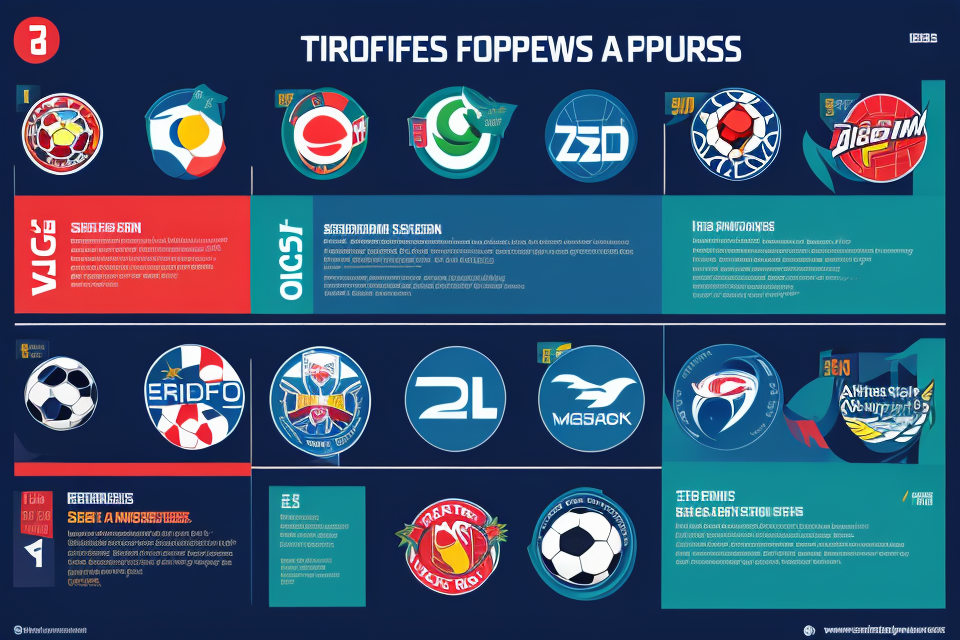Soccer is one of the most popular sports in the world, and many aspiring athletes dream of turning pro. However, attending college is not the only path to becoming a professional soccer player. In this article, we will explore alternative routes and strategies for becoming a pro soccer player without attending college. We will discuss the importance of developing skills, building a strong network, and staying committed to your goals. So, whether you’re a high school graduate or just starting out, this article will provide you with valuable insights and advice on how to turn your soccer dreams into a reality.
To become a professional soccer player without attending college, one needs to focus on developing their skills and getting noticed by scouts or coaches. This can be done by playing for local teams, attending tryouts, and participating in youth development programs. It’s important to have a strong work ethic, be dedicated to training, and have a passion for the sport. Networking with other players, coaches, and scouts can also help in getting noticed and getting opportunities to play at a higher level. Additionally, keeping up with the latest trends and techniques in the sport, and being able to adapt to different playing styles, can improve one’s chances of success.
The Importance of College in Soccer
College as a Platform for Professional Soccer
College soccer serves as a crucial stepping stone for aspiring professional soccer players. While attending college may not be a requirement for becoming a professional soccer player, it can provide a wealth of opportunities and resources that can aid in the pursuit of a career in soccer.
- College soccer as a stepping stone to professional leagues
One of the primary advantages of college soccer is that it provides a platform for players to showcase their skills and gain exposure to professional scouts and coaches. Many professional teams scout college soccer games and tournaments in search of talented players to add to their rosters. Additionally, college soccer can provide a more structured and competitive environment for players to develop their skills and improve their fitness levels.
- The role of college soccer in scouting and recruitment
College soccer teams often serve as feeder systems for professional teams, with many players being recruited directly from college into professional leagues. College coaches and scouts often have connections to professional teams and can help players navigate the recruitment process and secure opportunities to trial with professional clubs.
- The benefits of college soccer for player development
College soccer can provide a comprehensive player development program that includes access to top-level coaching, strength and conditioning programs, and sports medicine services. College soccer teams also often compete at a high level, providing players with the opportunity to test themselves against top competition and develop their mental and physical toughness.
Overall, while college soccer may not be necessary for all aspiring professional soccer players, it can provide a valuable platform for player development, exposure to professional teams, and recruitment opportunities.
Alternatives to College Soccer
There are several alternatives to college soccer that can help aspiring professional soccer players achieve their goals without attending college. These alternatives include semi-professional and amateur leagues, international soccer opportunities, and training and development outside of college.
Semi-professional and Amateur Leagues
Semi-professional and amateur leagues offer opportunities for aspiring professional soccer players to develop their skills and gain experience playing at a higher level. These leagues are often regionally based and provide a competitive environment for players to showcase their abilities. Players can also earn money from these leagues, which can help them support themselves while pursuing their soccer careers.
International Soccer Opportunities
International soccer opportunities can also provide a pathway for aspiring professional soccer players to achieve their goals without attending college. Many countries have professional soccer leagues that offer opportunities for players to compete at a high level. Additionally, international soccer tournaments and competitions offer opportunities for players to showcase their skills and gain exposure to professional scouts and coaches.
Training and Development Outside of College
Training and development outside of college can also be crucial for aspiring professional soccer players. Many professional soccer players have trained with personal coaches or at specialized soccer academies. These training opportunities can provide players with the skills and knowledge they need to succeed at the professional level. Additionally, players can also work on developing their physical fitness and conditioning through personal training or other fitness programs.
Overall, there are many alternatives to college soccer that can help aspiring professional soccer players achieve their goals. By exploring these options and focusing on training and development, players can increase their chances of success in the professional soccer world.
Skills and Abilities Needed to Be a Professional Soccer Player
Physical Attributes
As a professional soccer player, there are certain physical attributes that are necessary to excel in the sport. These attributes include:
- Speed: The ability to move quickly and efficiently is crucial in soccer. Players need to be able to accelerate, change direction, and move in different planes to gain an advantage over their opponents.
- Agility: Agility refers to the ability to change direction quickly and efficiently. Soccer players need to be agile to evade tackles, make quick turns, and move in small spaces.
- Endurance: Soccer is a physically demanding sport that requires a high level of endurance. Players need to be able to run for long periods of time, maintain a high intensity, and recover quickly between matches.
- Strength: Strength is important in soccer as it helps players to maintain control of the ball, resist tackles, and make successful challenges.
- Technical skills: Technical skills refer to a player’s ability to control and manipulate the ball. These skills include dribbling, passing, shooting, and ball control. To become a professional soccer player, it is essential to master these technical skills and use them effectively in matches.
Mental Attributes
Determination
Determination is a crucial mental attribute for any aspiring professional soccer player. It involves having a strong will to succeed and overcome obstacles. This attribute is necessary as it helps the player to push through challenging times and stay focused on their goals. It is important to have a positive attitude and keep working hard even when faced with setbacks.
Resilience
Resilience is another critical mental attribute for a professional soccer player. It refers to the ability to bounce back from adversity, setbacks, and failures. As a soccer player, you will encounter many challenges and obstacles along the way, and resilience helps you to stay strong and keep moving forward. This attribute involves developing a growth mindset, learning from mistakes, and staying motivated even when things do not go as planned.
Focus
Focus is a vital mental attribute for a professional soccer player. It involves being able to concentrate on the task at hand and block out distractions. As a soccer player, you need to be fully present and focused during training, games, and other activities. This attribute involves developing self-discipline, time management skills, and the ability to stay focused on your goals.
Leadership
Leadership is another important mental attribute for a professional soccer player. It involves having the ability to inspire and motivate others, communicate effectively, and make tough decisions. As a leader, you need to be able to set a positive example for your teammates and help them to achieve their goals. This attribute involves developing good communication skills, building trust with your teammates, and being able to make tough decisions under pressure.
Adaptability
Adaptability is a crucial mental attribute for a professional soccer player. It involves being able to adjust to new situations, learn from feedback, and change your approach when necessary. As a soccer player, you will encounter many different situations and challenges, and adaptability helps you to stay flexible and open-minded. This attribute involves developing a growth mindset, being open to feedback, and being willing to learn from your mistakes.
Networking and Marketing Yourself
As a prospective professional soccer player, networking and marketing yourself is an essential aspect of your journey to success. Here are some key points to consider:
- Building relationships with coaches and scouts: Building relationships with coaches and scouts is crucial to getting noticed and landing opportunities to play at higher levels. Attend soccer events and tournaments where coaches and scouts are likely to be present, and make sure to introduce yourself and give them your contact information.
- Utilizing social media to showcase your skills: Social media platforms like Instagram, Twitter, and Facebook can be powerful tools for promoting yourself as a soccer player. Share highlights of your games, training sessions, and other relevant experiences to demonstrate your skills and commitment to the sport.
- Attending soccer events and tournaments: Attending soccer events and tournaments is a great way to get exposure and make connections in the soccer world. Whether it’s a local league game or a national tournament, be sure to attend as many events as possible and network with other players, coaches, and scouts.
Overall, networking and marketing yourself is an essential aspect of becoming a professional soccer player. By building relationships with coaches and scouts, utilizing social media to showcase your skills, and attending soccer events and tournaments, you can increase your chances of getting noticed and landing opportunities to play at higher levels.
The Path to Professional Soccer
Identifying Opportunities
If you are interested in becoming a professional soccer player without attending college, it is important to identify opportunities that can help you achieve your goal. Here are some steps you can take to explore your options:
Researching and Contacting Teams and Coaches
One way to get noticed by professional teams is to research and contact them directly. You can use online resources such as team websites, social media accounts, and soccer forums to find contact information for coaches and scouts. Once you have identified the appropriate contact, you can send them an email or message introducing yourself and expressing your interest in playing for their team.
It is important to tailor your message to the specific team and coach. You should highlight your skills and experience, and explain why you believe you would be a good fit for their team. Be sure to keep your message brief and to the point, and follow up with any additional information or questions that the team may request.
Participating in Open Trials and Combine Events
Another way to get noticed by professional teams is to participate in open trials and combine events. These events are typically organized by sports agencies or scouting organizations, and allow players to showcase their skills in front of coaches and scouts from multiple teams.
To find open trials and combine events, you can search online or contact sports agencies and scouting organizations directly. It is important to research the event and the teams that will be attending to ensure that it is a good fit for your skills and goals.
Exploring International Opportunities
If you are unable to find opportunities in your home country, you may want to consider exploring international options. Many professional teams around the world have development programs or youth academies that you can apply to.
To find international opportunities, you can research online or contact sports agencies and scouting organizations that specialize in placing players abroad. It is important to carefully research the team and the country before committing to a trial or signing a contract.
In summary, identifying opportunities is an important step in becoming a professional soccer player without attending college. By researching and contacting teams and coaches, participating in open trials and combine events, and exploring international opportunities, you can increase your chances of getting noticed by professional teams and achieving your goal.
Staying Healthy and Injury Prevention
Maintaining a balanced diet and exercise routine
As a professional soccer player, it is crucial to maintain a balanced diet and exercise routine to ensure optimal performance on the field. This includes consuming a variety of nutrient-dense foods such as fruits, vegetables, lean proteins, and whole grains. Additionally, staying hydrated throughout the day is essential for maintaining energy levels and preventing dehydration during games.
Injury prevention techniques and exercises
Preventing injuries is a key aspect of maintaining a successful career as a professional soccer player. This can be achieved through the implementation of injury prevention techniques and exercises, such as stretching and strength training. Additionally, incorporating balance and stability exercises into your routine can help reduce the risk of ankle and knee injuries, which are common in soccer.
Recovery and rehabilitation methods
Injuries are an unavoidable part of any sports career, and it is important to have a plan in place for recovery and rehabilitation. This may include rest, ice, compression, and elevation (RICE) techniques, as well as physical therapy and other rehabilitation methods. It is important to work closely with a medical professional to ensure that you are following the appropriate recovery protocol for your specific injury.
By following these guidelines and implementing injury prevention techniques and exercises into your routine, you can significantly reduce your risk of injury and maintain optimal performance on the field.
Staying Motivated and Overcoming Challenges
Becoming a professional soccer player without attending college requires a great deal of dedication, perseverance, and motivation. It is important to set goals and track progress, build a support network, and cope with setbacks and failures.
Setting goals and tracking progress
One of the most effective ways to stay motivated is to set specific, measurable goals for yourself. These goals should be challenging but achievable, and should be broken down into smaller, more manageable steps. For example, you might set a goal to score a certain number of goals in a particular number of games, or to earn a certain number of caps for your national team. Once you have set your goals, it is important to track your progress and make adjustments as necessary. This will help you stay focused and motivated, and will give you a sense of accomplishment as you achieve each milestone.
Building a support network
Another key aspect of staying motivated is to build a strong support network. This can include family, friends, coaches, and other individuals who can provide encouragement, advice, and guidance as you pursue your dreams. It is important to surround yourself with people who believe in you and who will help you stay focused and motivated, even when things get tough. Whether you are training alone or working with a team, having a strong support network can make all the difference in your ability to stay motivated and overcome challenges.
Coping with setbacks and failures
Finally, it is important to be prepared for setbacks and failures along the way. Becoming a professional soccer player is a long and difficult journey, and there will be many obstacles and challenges along the way. It is important to develop coping strategies for dealing with these setbacks, such as maintaining a positive attitude, seeking out feedback and constructive criticism, and staying focused on your goals. By learning to cope with setbacks and failures, you will be better equipped to stay motivated and keep pushing forward, even when things get tough.
Staying Updated on the Latest Trends and Technology
Staying updated on the latest trends and technology is crucial for any aspiring professional soccer player. This involves keeping up with advancements in sports science and technology, using data and analytics to improve performance, and utilizing technology for injury prevention and recovery.
Keeping up with advancements in sports science and technology
Sports science and technology have come a long way in recent years, and it’s important for soccer players to stay informed about these advancements. This can include things like new training methods, equipment, and nutrition practices. By staying up-to-date on the latest research and developments in these areas, players can gain a competitive edge and improve their performance on the field.
Using data and analytics to improve performance
Data and analytics are becoming increasingly important in soccer, as teams use these tools to analyze player performance, track opponents, and identify patterns in the game. As a result, it’s important for soccer players to be familiar with data analysis and to use these tools to their advantage. This can involve tracking their own performance using statistics and metrics, as well as using data to inform training and strategy.
Utilizing technology for injury prevention and recovery
Technology can also play a role in injury prevention and recovery. This can include things like wearable technology that tracks movement and provides feedback on technique, as well as software that analyzes movement patterns to identify potential areas of injury. By using these tools, players can reduce their risk of injury and speed up their recovery if an injury does occur.
Overall, staying updated on the latest trends and technology is essential for any aspiring professional soccer player. By keeping up with advancements in sports science and technology, using data and analytics to improve performance, and utilizing technology for injury prevention and recovery, players can gain a competitive edge and achieve their goals on the field.
Staying Safe and Avoiding Burnout
Maintaining a healthy work-life balance is crucial for avoiding burnout in the demanding world of professional soccer. It’s important to have a clear understanding of what’s truly important to you, and to set boundaries for yourself. This means prioritizing your family, friends, and personal interests, and ensuring that you have time for them outside of soccer. Additionally, it’s important to be mindful of your physical and mental health, and to seek help when needed.
Prioritizing mental health and well-being is also key. Professional soccer can be a high-pressure environment, and it’s important to find ways to manage stress and stay positive. This might involve seeking out a therapist or counselor, or talking to a trusted friend or family member. Additionally, it’s important to take care of your physical health, and to seek medical attention if you’re feeling unwell.
Taking breaks and time off from soccer is also important for avoiding burnout. This might involve taking a few days off after a tough stretch of games, or taking a longer break during the off-season. It’s important to give yourself time to rest and recharge, and to come back to soccer feeling refreshed and ready to go.
In summary, maintaining a healthy work-life balance, prioritizing mental health and well-being, and taking breaks and time off from soccer are all important for avoiding burnout and staying safe as a professional soccer player.
FAQs
1. Is it possible to become a professional soccer player without attending college?
Yes, it is possible to become a professional soccer player without attending college. Many professional soccer players around the world have made it to the top without a college degree. However, it requires a lot of hard work, dedication, and talent to make it to the professional level.
2. What are the steps to becoming a professional soccer player without college?
The steps to becoming a professional soccer player without college are:
1. Start playing at a young age: The earlier you start playing soccer, the better your chances of becoming a professional player.
2. Develop your skills: Work on your strengths and improve your weaknesses.
3. Get exposure: Play in local leagues, tournaments, and showcases to get noticed by scouts and coaches.
4. Get training: Seek out professional training and coaching to improve your skills and knowledge of the game.
5. Network: Build relationships with coaches, scouts, and other players in the industry.
6. Be persistent: Stay focused and committed to your goal of becoming a professional soccer player.
3. What are the advantages of attending college for soccer players?
Attending college can provide several advantages for soccer players, including:
1. Scholarships: Many colleges offer scholarships to talented soccer players, which can help pay for their education and reduce the financial burden.
2. Coaching: College coaches are often experienced and knowledgeable, and can provide high-level training and guidance to help players improve their skills.
3. Exposure: College soccer can provide exposure to professional scouts and coaches, who may be looking for talent to sign for their teams.
4. Education: College can provide a well-rounded education, which can be beneficial for players who want to pursue careers outside of soccer.
4. Can I still become a professional soccer player if I don’t have the financial means to attend college?
Yes, you can still become a professional soccer player even if you don’t have the financial means to attend college. There are many ways to develop your skills and get exposure to professional scouts and coaches, such as playing in local leagues and tournaments, seeking out professional training and coaching, and networking with other players and coaches in the industry. It may take more effort and determination, but it is still possible to achieve your goal of becoming a professional soccer player without attending college.



